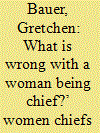|
|
|
Sort Order |
|
|
|
Items / Page
|
|
|
|
|
|
|
| Srl | Item |
| 1 |
ID:
170208


|
|
|
|
|
| Summary/Abstract |
Following the adoption of the Senegalese Law on Parity and the subsequent influx of women to the National Assembly, we saw a strong gendered polarisation of attitudes towards women as political leaders among the Senegalese population. This study explores whether similar attitudinal changes are found among political elites in the Senegalese National Assembly. Theory suggests that an increase in the number of women elected to legislatures (‘descriptive representation’) will challenge people's perceptions of politics as a male domain and strengthen belief in women's ability to govern (‘symbolic representation’). Although the effects of gender quotas on women's representation has received considerable scholarly attention, the field of symbolic representation remains under-studied. A case study of the effects of the Senegalese parity law addresses this knowledge gap, contributing with new empirical insights. This study also develops indicators that can help measure potential developments in the symbolic representation of women. Parity appears to have contributed to slightly more acceptance towards women as political leaders within the National Assembly. The findings are discussed in the last section.
|
|
|
|
|
|
|
|
|
|
|
|
|
|
|
|
| 2 |
ID:
186668


|
|
|
|
|
| Summary/Abstract |
The electoral connection incentivizes representatives to take positions that please most of their constituents. However, on votes for which we have data, lawmakers vote against majority opinion in their district on one out of every three high-profile roll calls in the U.S. House. This rate of “incongruent voting” is much higher for Republican lawmakers, but they do not appear to be punished for it at higher rates than Democrats on Election Day. Why? Research in political psychology shows that citizens hold both policy-specific and identity-based symbolic preferences, that these preferences are weakly correlated, and that incongruous symbolic identity and policy preferences are more common among Republican voters than Democrats. While previous work on representation has treated this fact as a nuisance, we argue that it reflects two real dimensions of political ideology that voters use to evaluate lawmakers. Using four years of CCES data, district-level measures of opinion, and the roll-call record, we find that both dimensions of ideology matter for how lawmakers cast roll calls, and that the operational-symbolic disconnect in public opinion leads to different kinds of representation for each party.
|
|
|
|
|
|
|
|
|
|
|
|
|
|
|
|
| 3 |
ID:
144810


|
|
|
|
|
| Summary/Abstract |
Across the globe women are accessing national legislatures and executives in unprecedented numbers. Over the last 25 years several African countries have led the way in women’s representation in parliaments and, more recently, in cabinets. At the same time, governments and foreign donors are increasingly focusing on the role of traditional leaders in local-level politics as states democratize and decentralize across the continent. Once considered hopelessly undemocratic and patriarchal, traditional leaders are more recently viewed in many African countries as one half of a viable and effective hybrid system at the local level. In addition, whereas the role of chief has been largely the preserve of African men, African women are increasingly asserting a right to become chief. This article, using Botswana as a case study, suggests that the increased presence of women in national legislatures and executives may be having a symbolic representation effect on African women who are insisting that they too may access political power, even in positions formerly unavailable to them, such as chief. This article further suggests that, like their women counterparts in African parliaments, once they gain access to political office, women chiefs may substantively represent women’s interests, in venues such as a House of Chiefs and in their communities.
|
|
|
|
|
|
|
|
|
|
|
|
|
|
|
|
|
|
|
|
|